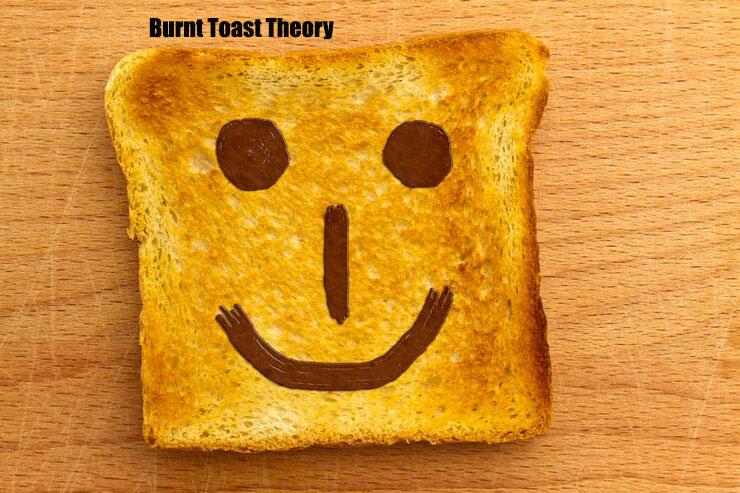Introduction
Ever had one of those days where everything seems to go wrong? You wake up late, spill coffee on your shirt, and to top it all off, you burn your toast. These minor annoyances might feel like the universe conspiring against you, but what if there was more to it? Enter the “Burnt Toast Theory,” a concept suggesting that life’s little setbacks might serve a greater purpose. In this article, we’ll delve into what the Burnt Toast Theory is, its origins, and how it can change your perspective on everyday challenges.
What is the Burnt Toast Theory?
Definition and Concept
The Burnt Toast Theory posits that small inconveniences, like burning your toast, can prevent larger, more significant problems. The idea is that these minor disruptions act as a form of cosmic protection, steering you away from worse outcomes. For example, burning your toast might delay you just enough to avoid a traffic accident or other misfortune.
Origins of the Theory
The exact origins of the Burnt Toast Theory are unclear, but it has roots in both popular culture and philosophical thought. It draws parallels with the Butterfly Effect, a concept in chaos theory where small changes in initial conditions can lead to vastly different outcomes. While not scientifically proven, the Burnt Toast Theory has gained traction as a comforting perspective on life’s unpredictability.
Philosophical and Psychological Underpinnings
Stoicism and Acceptance
The Burnt Toast Theory aligns with Stoic philosophy, which emphasizes accepting what we cannot control and finding peace in adversity. By viewing minor setbacks as potential blessings in disguise, individuals can cultivate a more resilient and optimistic mindset.
Cognitive Reframing
Cognitive reframing is a psychological technique used to shift perspectives on stressful events. The Burnt Toast Theory serves as a form of cognitive reframing, encouraging people to see the positive side of negative experiences. This shift can reduce stress and improve overall well-being.
Practical Applications of the Burnt Toast Theory
Everyday Life
Incorporating the Burnt Toast Theory into daily life can help individuals navigate challenges with a more positive outlook. Instead of getting frustrated by small setbacks, people can view them as possible protective measures against larger issues.
Work and Career
At work, the Burnt Toast Theory can help professionals cope with unexpected obstacles. Missed deadlines or failed projects can be seen as opportunities to learn and grow, rather than purely negative experiences.
Relationships
In relationships, the theory can promote patience and understanding. Minor disagreements or misunderstandings might be viewed as necessary for strengthening the bond and preventing more significant conflicts in the future.
Criticisms and Counterarguments
Skepticism and Rationality
Critics argue that the BurntToast Theory lacks scientific evidence and can lead to irrational thinking. It’s important to balance the comforting aspects of the theory with a rational understanding that not every setback has a deeper meaning.
Overemphasis on Positivity
While positive thinking is beneficial, overemphasizing the silver lining in every situation can lead to denial or avoidance of real issues. Acknowledging and addressing problems directly is crucial for personal growth and development.
Scientific Perspectives
Probability and Coincidence
From a scientific standpoint, many of the “protective” effects described by the BurntToast Theory can be attributed to probability and coincidence. While it’s comforting to think that burning your toast saved you from an accident, it’s more likely that these events are unrelated.
Psychological Benefits
Despite the lack of scientific proof, the psychological benefits of adopting the BurntToast Theory are evident. By fostering a positive outlook and resilience, individuals can better cope with life’s challenges and maintain mental well-being.
Stories and Anecdotes
Personal Accounts
Many people share personal stories where a minor setback led to a seemingly beneficial outcome. These anecdotes reinforce the idea that small inconveniences might play a role in preventing larger problems, even if purely coincidental.
Historical Examples
Historical events often contain moments where small, seemingly negative occurrences led to positive outcomes. These stories can serve as powerful reminders of the potential hidden benefits within life’s challenges.
Incorporating the Burnt Toast Theory into Your Life
Mindfulness and Reflection
Practicing mindfulness and reflection can help individuals recognize and appreciate the potential benefits of minor setbacks. Taking time to reflect on daily experiences can foster a deeper understanding and acceptance of life’s unpredictability.
Gratitude Practices
Incorporating gratitude practices into daily routines can enhance the positive effects of the BurntToast Theory. By focusing on the good in every situation, individuals can build a more resilient and optimistic outlook on life.
Conclusion
The Burnt Toast Theory offers a unique perspective on life’s small setbacks, suggesting that they might serve a greater purpose. While not scientifically proven, the theory aligns with philosophical and psychological principles that promote resilience and positive thinking. By incorporating the Burnt Toast Theory into our lives, we can navigate challenges with a more optimistic outlook and find comfort in the idea that even minor inconveniences might protect us from larger misfortunes.
FAQs
What is the Burnt Toast Theory?
The BurntToast Theory suggests that small inconveniences, like burning your toast, can prevent larger, more significant problems. It posits that these minor disruptions might serve a protective purpose.
Is the BurntToast Theory scientifically proven?
No, the Burnt Toast Theory is not scientifically proven. It is more of a philosophical and psychological concept that promotes a positive outlook on life’s setbacks.
How can I apply the BurntToast Theory in my life?
You can apply the BurntToast Theory by viewing minor setbacks as potential blessings in disguise. Practicing mindfulness, reflection, and gratitude can help incorporate this perspective into daily life.
What are the criticisms of the BurntToast Theory?
Criticisms include the lack of scientific evidence and the potential for irrational thinking. Overemphasis on positivity can also lead to denial or avoidance of real issues.
Can the BurntToast Theory improve mental well-being?
Yes, adopting the Burnt ToastTheory can improve mental well-being by fostering resilience and a positive outlook. While not scientifically validated, it can help individuals cope with stress and challenges more effectively.











